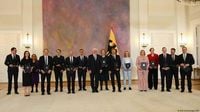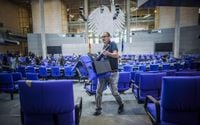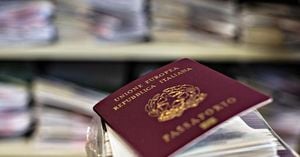The newly elected Bundestag, Germany's federal parliament, gathered in Berlin for its inaugural session on March 25, 2025, marking a pivotal point in the nation's political landscape. This meeting comes precisely 30 days after the federal elections, adhering to the Basic Law, which mandates that the new parliament convenes within this timeframe. As such, it begins the 21st legislative term amid an array of political transitions and negotiations.
At the start of the session, Chancellor Olaf Scholz, who leads the Social Democratic Party, along with his fourteen ministers, submitted their resignations to President Frank-Walter Steinmeier. Following the election, they will continue to manage government functions only in a caretaker role until a new coalition government takes shape. This transitional period is due to ongoing coalition negotiations primarily between the Christian Democratic Union (CDU) and the Social Democrats.
According to Article 69 of the German constitution, the current government remains in office until the new parliament has convened, ensuring that the country can continue functioning effectively. The session was temporarily chaired by Gregor Gysi, the oldest member of parliament, until a new president for the Bundestag could be elected.
In a significant moment for gender representation in German politics, Julia Klöckner from the CDU was elected as the new speaker of parliament. Her election marks her as the fourth woman to take on this high-ranking official role, positioned second only to the federal president in terms of protocol importance. Securing a substantial majority in the vote, Klöckner received 382 votes in favor compared to 204 against, with five abstentions and five invalid votes. Her election signifies a positive stride toward gender equality in political leadership.
During her acceptance of the speaker's position, Klöckner promised to guide the new assembly with openness and respect, stating her intention to put aside divisive rhetoric in favor of constructive dialogue. This commitment is particularly potent given the current political climate characterized by rising tensions and challenges in coalition-building.
Alongside Klöckner, the Bundestag also elected four deputy speakers: Andrea Lindholts from the Bavarian Social Democrats, Josephine Ortleb from the Social Democratic Party, Omid Nouripour from the Green Party, and Bodo Ramelow from the Left Party. Each deputy represents key voices in the diverse spectrum of current German politics.
Despite the electoral success of the Alternative for Germany (AfD) party, which saw its membership increase to 152 representatives and garnered approximately 20.8% of votes, it faced a notable setback in its ambition for leadership positions within parliament. The coordinated efforts of other political groups to maintain a protective barrier against extremist parties resulted in the AfD's unsuccessful bids for positions in the Bundestag presidium.
Bernd Baumann, the AfD’s parliamentary leader, expressed disappointment and frustration regarding the opposition's strategy to exclude them from power structures. He stated, "We demand all rights and positions that are due to us as the largest opposition group in the Bundestag," after the party’s representatives were unable to secure any deputy speaker roles. This illustrates the ongoing political resistance against the AfD, which many political opponents categorize as extremist.
Gerold Otten, one of the AfD candidates for a deputy position, reflected on the circumstances with dismay, calling it, "the lowest point in the history of the parliament" after they faced defeat in three rounds of voting.
With these significant developments, the new Bundestag’s inaugural session is set against a backdrop of pending negotiations for a coalition government, which could shape Germany’s political future. The ongoing discussions between parties aim to establish a stable governing body in the face of rising claims by the AfD, highlighting the faction's growing yet contentious role in the German political arena.
This initial assembly session not only denotes the official start of legislative duties but also serves as a platform reflecting the dynamic and shifting landscape of German politics, influenced by the interplay of coalition negotiations, gender representation, and the persistent challenges posed by emerging political forces.





